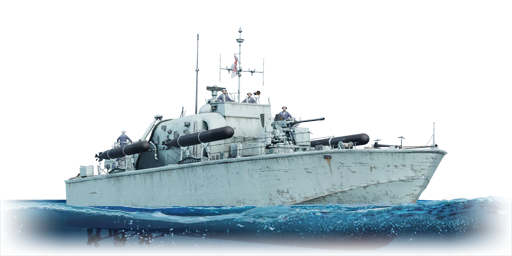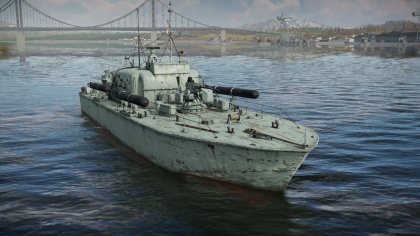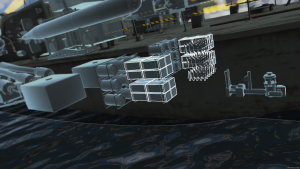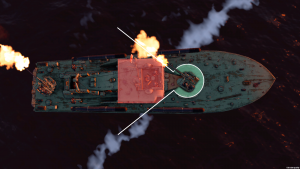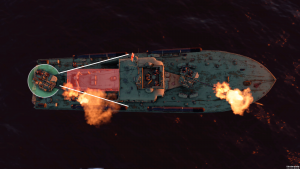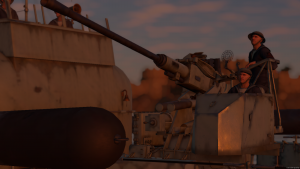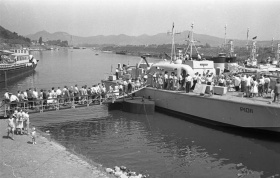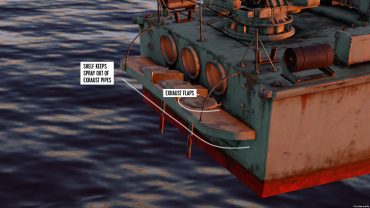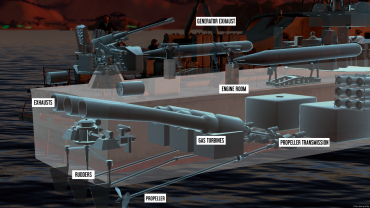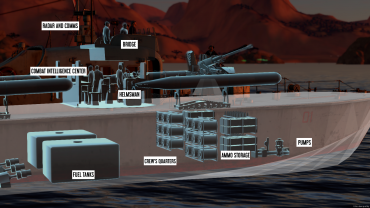Brave Borderer
Contents
Description
The Brave-class, Brave Borderer (P1011) is a rank V British motor torpedo boat
with a battle rating of 3.3 (AB/RB/SB). It was introduced in Update 1.83 "Masters of the Sea" as part of the British fleet closed beta test.
The Brave-class fast patrol boats were a class of two MTBs (Motor Torpedo Boats) built between 1958-1960 for the Royal Navy. They became the last type of MTB to be built for the Royal Navy's coastal forces, but their design cemented the foundation to many more amazing fast crafts used by navies around the world.
HMS Brave Borderer (pennant number P1011), brings the potential to increase the already remarkable firepower of the single-armed Dark class. Not only doubled on this Brave-class but with an increase in speed, thanks to the quick-sailing gas turbines of the Brave Borderer, which allowed her to break world records at her epoch.
Great mobility, great guns and very well rigged with four lethal torpedoes plus depth charges!- The Brave-class surely ain't short of braveness but only of crew members; therefore low crew size becomes one of the main drawbacks of this class directing the general playstyle of the boat. She can be really fun to play, but also very frustrating due to her poor combat endurance.
General info
HMS Brave Borderer is a very fragile ship; her design emphasises agility over durability. She is really powerful in the offensive department, but her defences and survival are not prominent. Her crew might seem average, but her enormous size attracts a lot of fire that will sink the boat in no time. At her rank, the stock version of the fast craft really is not that advantageous. It is essentially a more deadly version of the FPB 1102, while possessing another 40 mm gun on the back of the boat, which enhances its ability to deal serious damage.
However, even with this increase in armament, it lacks the firepower and mobility to conventionally engage larger craft such as the destroyers commonly found at her battle rating. Also, the boat lacks an AI turret to provide some anti-air coverage which means the player must manually control the guns to defend against aircraft or boats, one at a time. Hence the players really need to commit to module research to boost the abilities of this boat and thus outweigh the pros and cons.
Survivability and armour
Brave Borderer has the following armour layout:
- Hull: 40 mm, wood
- Superstructure: 15 mm, wood
Brave Borderer's crew is 20 sailors. This is not enough to endure sustained combat actions, as often a single high calibre shell impact (100+ mm) from a destroyer or frigate, will trigger a hullbreak. Against other boats, she might survive longer, but the proper strategy is to fire first to conserve the crew as much as possible. The complement of the ship is actually the average crew size of most fast patrol boats at her rank. But this boat will often face vessels with the double of the crew size.
Therefore, the Brave-class must usually be on the defensive since it does not carry any crew-size advantages. The guns really help Borderer on this, as they have a high angle of drop and they can be aimed behind barrier islands or solid formations, keeping the Borderer visually covered from direct enemy fire.
| Careful, these guns share similar properties and ballistics to the guns present in the powerful Italian fast crafts, the Freccia P-493 and Folgore P-490 |
The boat lacks any sort of armour shielding and the gun turrets are also exposed. This means all the guns can be taken out of combat with low-calibre machine guns or even shrapnel. This also applies to the most lethal component aboard the Brave Borderer; the torpedoes. If these are hit, it is likely they will just remain out-of-service until repairs are made.
However, there's a possibility of a catastrophic detonation depending on the amount of explosive mass inside the shell that hit the torpedo. The same applies to the depth charges ammunition in the stern of the boat, as it is also unprotected. The more volatile area of the Borderer is located at the bow. This area is replete of ammunition and depth charges. It only requires a direct hit to finish the entire Brave Borderer.
The bridge where the helmsman operates the ship is actually decently protected within the boat's superstructure. The deck bridge is somewhat more exposed to machine gun and cannon fire and can be taken out. But often the Borderer will conserve its capacity to manoeuvre because of how adequately the control bridge is located.
Mobility
Brave-class mobility is actually marvellous. It enables the boat to reach speeds up to 130 km/h in arcade mode!
Reverse speed is pretty good as well. It can be used to retreat of a distress situation without turning the whole vessel.
| Mobility Characteristics | |||
|---|---|---|---|
| Game Mode | Upgrade Status | Maximum Speed (km/h) | |
| Forward | Reverse | ||
| AB | |||
| Upgraded | 130 | 55 | |
| RB/SB | |||
| Upgraded | 93 | 40 | |
Brave-class is currently the speediest fast attack craft available for the Royal navy in the game. Also one of the fastest in the game and within her rank. This is all thanks to her remarkable marine powerplant of three Bristol Proteus gas turbines engines providing a total thrust-power of 10,500 hp.
| Coincidence, this same turboprop engines can be found in the Italian hydrofoil fast craft, Sparviero. |
The boat is really good at the frontal speed, she can get wheresoever is needed because of that. However, her steering is not as prominent, likely because of her wide hull beam and large hull, especially when stock and with low-speed. When compared with the preceding Dark-class, the mobility in the forward aspects received an amazing boost from the diesel engines, but the turning agility is somewhat reduced because the Dark-class had a more narrow beam and was able to turn tightly because of their small and nimble size.
Ironically, the Brave Borderer perhaps will face some trouble coasting and manoeuvring tightly over archipelagos and reduced strait's borders. But the speed does provide great open-sea performance, where it can rule the tides providing fast support with her torpedoes.
Her capacity to fire while cruising at high-speeds or in heavy seas is adequate. This is possible thanks to a stabilization system of electro-hydraulic flaps located at the bottom of the transom that "cushion" the ship's slamming during rough seas.
Armament
Primary armament
The Brave Borderer is armed with two 40 mm QF (Quick-Firing) Mark VII guns, one located at the bow of the boat, and the other located at the stern.
The only guns available offer really good rate of fire (0.4 seg), seemingly infinite fire, and with a rare overheating presence. The amount of ammunition is 1,500 rounds per gun. They are highly mobile gun-mountings and can be rotated 360° in a few seconds, thanks to their 34°/s rotation. This is great to not only fight sea-based threats but to fend off enemy aviation with 40°/s in vertical targeting. They have also good elevation angles, 88°. This allows to engage enemy aircraft and continue the fire not only thanks to the rate of fire, but the disponibility of mountings to target the plane above the Borderer.
The ballistics of the guns are adequate for the calibre. Very precise fire capable to effectively target specific areas in enemy vessels. They have an astounding firing range of approximately 5,000 m. This range value is only at the discretion of the player's ability to land the shots at such distances; with the proper horizontal leading calculations. In regular combat conditions (high speed, waves and constant directional changes), this range can be reduced to some 3,500 m, where the aiming is more effective no matter the motion of the Brave-class and the target.- Since Borderer can effectively out-range many other patrol boats in gunnery duels thanks to the dual 40 mm guns, is not needed to bring the Brave-class point-blank range with the target.
The 40 mm QF Mark VII cannons can fire for 1 minute 20 seconds until overheating or jamming. Firing with the Ranging shot key would likely double this time; this is more than enough to destroy any fast craft or correct the fire.
A combat flaw important to note is that despite the guns can horizontally rotate 360°, the horizontal firing arc is actually limited. The superstructure of the bridge in the centre of the boat creates a big dead zone on both of the guns. This unable the aft and forward guns to fire frontally and backwardly, respectively. This dead zone will hinder the Borderer's ability to defend against enemies in the front of the boat, or behind the boat. Only 1 gun will fire against the enemy, and the damage will be reduced. Hence mobility and smart positioning take an important part in how well the Brave-class can use both of the guns.
There are three ammunition options available:
- Universal: AP-T · HEFI-T
- 40 mm HE clips: HEFI-T · HEFI-T · HEFI-T · AP-T
- 40 mm AP clips: AP-T · AP-T · AP-T · HEFI-T
The recommended belt to equip as the principal belt is the HE belt, as it provides the more effective damage per explosive damage against other small boat's crew, even unarmoured destroyers' crew can easily be decimated by the HE belt, as well as being highly effective against aircraft.
Using AP belt against small patrol boats won't be as effective due to the overpenetration of the AP shells and the lack of explosive effect. Players shall need to switch to AP belt in case of facing armoured boats or armoured gunboats.
The universal belt is up to player's choice since the belt will offer 50-50 chances of effective damage to any target, but it might not be as damage-effective promptly when compared with a dedicated belt.
| Penetration statistics | ||||||
|---|---|---|---|---|---|---|
| Belt | Penetration @ 0° Angle of Attack (mm) | |||||
| 10 m | 100 m | 500 m | 1,000 m | 1,500 m | 2,000 m | |
| Universal | 80 | 77 | 66 | 57 | 50 | 45 |
| 40 mm HE clips | 80 | 77 | 66 | 57 | 50 | 45 |
| 40 mm AP clips | 80 | 77 | 66 | 57 | 50 | 45 |
Torpedo armament
Brave Borderer can be equipped with four 533 mm Mk.VIII torpedoes.
The torpedoes are localized on the port and starboard of the bridge, two on each side. They are unprotected by any armour nor torpedo tube.
The absence of any torpedo tubes also alters the type of launching, as the Dark class had outwardly angled torpedo tubes which could be useful in some occasions. In this Brave-class, that is not the case. The four torpedoes are frontally aimed and dropped directly to bow.
The exposed location and the poor protection of the torpedoes are some things to worry about. If the Borderer is struck, is likely the torpedoes will receive some damage or become inoperative and in the worst scenario, explode.
The torpedoes should be viewed as the main offensive element in the boat's arsenal. They are meant to multiply the potential of the Brave-class against destroyers or even cruisers. They serve almost exclusively to this purpose, as the 40 mm guns are ineffective against ships of such large sizes. Therefore torpedoes become the most lethal explosive armament of the Borderer.
The torpedoes offer really adequate speed, range and damage properties capable of sinking even cruisers when hit on critical areas.
| Torpedo Characteristics | ||||||||
|---|---|---|---|---|---|---|---|---|
| Torpedo Mode | Mass (kg) | Maximum speed in water (km/h) | Travel distance (km) | Depth stroke (m) | Arming distance (m) | Explosive type | Explosive mass (kg) | TNT equivalent (kg) |
| No | 1566 | 84 | 4.57 | 1 | 50 | TNT | 327 | 327 |
| Yes | 1566 | 76 | 6.40 | 1 | 50 | TNT | 327 | 327 |
The Torpedo Mode modification is available as a tier IV modification. Installing it has the following changes:
| Torpedo Mode Specification Changes | |
|---|---|
| Max Distance (m) | Max Speed (m/s) |
| +1830 | -8 |
The Torpedo mode is recommended on Realistic Battles because the 6.40 km range is more important for safety than the torpedo speed, especially on open sea maps or Encounter mode (to target cargo ships from safe distances, for example).
In Arcade battles, the Torpedo mode should be uninstalled to increase the speed of the torpedo, making it more hard to avoid in the regular close encounters of Arcade. They also will be reloaded constantly, so the amount of lethality is increased exponentially.
Special armament
Brave Borderer can be equipped with two Mk.VII depth charges.
| Mass (kg) | Explosive Type | Explosive Mass (kg) | TNT Equivalent (kg) |
|---|---|---|---|
| 196 | TNT | 130 | 130 |
The Mk.VII depth charges are carried near the aft 40 mm gun, in racks, one on each side. They are dropped one at a time in the following order:
- Port
- Starboard
Before spawning, the detonation time delay can be set anywhere between 3 seconds and 10 seconds.
With the absence of the submarines threat, there are not many practical reasons to use depth charges. However, they usually only require a single hit to sink a surface vessel if used properly, even on early destroyers. The depth charges can also become a liability during combat; their onboard detonation will usually be fatal to the Borderer since they essentially act as exposed ammo racks before they're dropped.
Some will think best to equip all the lethal and useful armaments to battle, while others will prefer to not carry such delicate cargos at all. It's up to the captains to decide if the risk is worth a potential reward.
Their use is also extremely situational, this is because they require the carrying ship to get really close to the target, to then release the charges. This means the depth charges won't be the ideal weapon to deal with the usual long-distance engagements much needed on the Borderer. With some luck though, sailing high-speed up right next to a slower target and dropping a depth charge can lead to some success. If attempting this, remember the depth charge drop order and set the depth charge time delay to a minimum of 3 seconds, since any higher time delay will only mean that the depth charge will sink further, and thus away, from the target.
Usage in battles
Borderer excels at high-speed cruising, so players should remember to let her operate at high speed. Avoiding low-speed manoeuvres or tight shore passages which only make her vulnerable to enemy fire and incapable of escaping combat with her innate speedy engines.
The firepower is very adequate versus vessels equally sized or sometimes quite bigger than the Brave-class. With the long-range of the guns and the rate of fire, players can spawn, head back to somewhere behind the small boat's area and proceed to snipe from afar, keeping her low crew numbers safe. This tactic will employ the Borderer as a stationary artillery emplacement. But it requires above-average gunnery skills to land the shots consecutively until the target is sunk. If needed, practice this tactic with the boat during a test sail or a custom battle.
Very few ships can similarly perform this tactic at her battle rating. Amongst them, the lethal and infamous Freccia P-493 with her 3 x 40 mm guns, 1 additional 40 mm gun when compared with the two turrets of the Brave-class. So captains should be on the look out for the kind of threats that are capable of similar ranges of fire to the Borderer.
If none of these threats are present (during low-ranked battles), it is likely the Borderer will cause a lot of damage to the enemy's patrol boats and frigates within the coastal area of the map. On some maps, even cargo ships can be targeted from really far distances!
For players looking for detailed roles, some ideas are presented:
- High seas support
Speed greatly benefits boats during open sea battles; speed is what the Brave-class possesses. Thus the Brave-class is currently among the best-fitted British boats to play in higher ranked battles. The speed allows the Brave-class to perform a wide range of supporting duties during open-sea battles, especially when working together with cruisers or destroyers.
With the torpedoes, the player or a group of torpedo boats can vex enemy cruisers. This torpedoing is not a defining duty, since the goal is to actually dispose of the torpedoes while staying alive.
The Brave-class can furthermore utilize its great speed to provide close air-protection or interception to enemy planes flying low with the intention to launch torpedoes. The Borderer can also release smoke screens when an allied ship steers and heads reverse during a retreat. Staying close to squadmates will also grant the chance to help in combat repairs.
This is a different playstyle outside the reduced spaces of small boats combat zones that delivers a lot of sea to navigate with the Borderer. It is likely she will face other fast craft doing the same tasks during these battles.
- Cargo ship hunter
Especially during Realistic battles, the Encounter mode will often be prolongated by the inability to destroy all the cargo ships. So the player can use the Borderer to hunt and sink these ships.
Plan a route that will increase the chances of survival while facing minimal or no opposition (usually the edges of the map). After finding the cargo ships, proceed to launch each of the torpedoes first. Even if the Borderer is swiftly spotted and destroyed, the 4 torpedoes will be on an impact course. Once the torpedoes are launched, halting to rest then opening fire with the guns is a choice. Otherwise, proceed at full speed near a ship and drop a depth charge. Since the goal is to use the infiltration to cause as much damage to many ships as possible, providing good results for the team.
- Torpedo support
This works better during Arcade battles, as the torpedoes will be infinitely reloaded.
The Borderer can head into the open sea with the main combat fleet and release the 4 torpedoes. Proceed to retreat with smoke and repeat; something must eventually find its way to the torpedoes. In a similar approach, she can remain near the coast ambushing the big ships intruding to the coastal areas of the map. If the situation demands it, getting really close to big ships and freeing the depth charges can cause serious damage. But Borderer could end sunk while attempting this, so it remains a last resort tactic.
Having the torpedo mode off while hunting with the torpedoes in Arcade is preferably, but optional.
Enemies worth noting
German Navy - Kriegsmarine ▀
Mehrzweckboot MZ1: She possesses everything the Brave Borderer does not. More than the double the crew size, and very punchy and armoured turrets. But she lacks one thing; speed. Borderer can use her immense size as tug target and decimate her crew from really far away. In close ranges, stay on the move and fire first while procuring not getting hit by her 88 mm cannons. She can't escape the speed of the Borderer but she will fire back. The MZ1 is among the highest armed motor gunboats of the rank.
AF D3 & AF D1: Germany possesses several highly armed barges at this rank, watch against those and avoid direct engagements. Their guns won't give second chances, so the best tactic is to fire from behind cover. Their guns ballistics will hinder them on this, while the Borderer will constantly reduce their crew to 0% with HE clips. There's no need to use AP belts since the barge is barely armoured.
Jaguar-Klasse (140): This fast attack craft is the ultimate challenge. They have great speed, they have great guns, which are equal or superior to the Borderer's, and they also have a crew size upper hand. The only chance the Brave Borderer has is to surprise this vessel with non-stop suppressive fire well-sprayed in her entire hull. Borderer is also way smaller and can use her agility to attack and disengage very quickly. If the attack failed don't fret; use the Borderer's advantage in speed to leave the combat zone immediately while popping a smokescreen behind.
Soviet navy - Военно-морской флот СССР (Military Maritime Fleet of the USSR) ▂
Project 183 and Project 206 : These Soviet fast boats are a notable threat to the Borderer due to their high rate of fire. If the Captains decide to join the fight on close battles in the boat's area, is likely this menacing boats will be present. The high rate of fire of their guns is not comparable with the Borderer's. The only chance to win against these boats is to fire first and remain unseen from afar. Effectively outraging their superior fire rate while decreasing their equally vulnerable crew.
Italian Navy - Regia Marina ▀
Freccia P-493 & Saetta P-494: These are one of the biggest fast boats threats in naval battles. Their superb HE ammo and better crew size will be a challenge to fight against. Their guns which are very similar to the Brave-class's 40 mm Bofors guns, counter the main gameplay tactic of the Borderer (long-distance engagements). So it's all up to who fires first and accurately enough. The guns of these Italian boats will sink the Borderer in seconds, and just like the Brave-class's, the Bofors guns barely stop shooting. Smart British captains must note the presence of one of these boats early on, plan the attack carefully and concisely. Otherwise, they will be fired back in the same way (over cover). And when this happens, there's almost nowhere to hide; only the great top-speed of the Brave-class can keep it alive and running if the surprise advantage is lost.
In the case of the Saetta, she is armed with a very unique armament; a guided anti-ship missile, the Nettuno. The recommended defence when being targeted with this missile is to quickly steer the ship to the opposite direction while releasing a smokescreen. Do not attempt to fire at the missile. (to success, high speed is needed)
Modules
| Tier | Seakeeping | Unsinkability | Firepower | |||
|---|---|---|---|---|---|---|
| I | Dry-Docking | Tool Set | 40 mm HE clips | |||
| II | Rudder Replacement | Fire Protection System | Smokescreen | 40 mm AP clips | ||
| III | Propeller Replacement | Improved Rangefinder | Primary Armament Targeting | Depth Charges | ||
| IV | Engine Maintenance | New Pumps | Artillery Support | Torpedo Mode | ||
HE clips should be acquired first along with the Tool Set and Fire Protection System. Mobility and Smokescreen come later, with the depth charges being among the last to research.
Pros and cons
Pros:
- 2 x 40 mm cannons offer almost unlimited damage, thanks to the rate of fire
- Standard number of torpedoes with decent properties
- Depth charges are available as special weaponry
- Superiorly fast, currently the fastest vessel in the British coastal tree
- Extremely adequate range of fire of the 40 mm guns on skilled hands, around 5,000m
- AP belt easily takes out armoured naval targets such as the Soviets MBK-161 (1943)
- Hull design possesses high sea-keeping qualities for rough sea; conserved accuracy when firing
Cons:
- Expensive price once all modifications have been researched; this mimics her real-life expensiveness
- Both 40 mm guns cannot fire directly backwards or frontally
- Very low combat endurance against bigger vessels due to minimal crew size
- Large for a Motor Torpedo Boat; easily targeted at low speeds and close ranges
- Sluggish in low speeds turns
- No auxiliary armament or anti-air, only manually guided guns
History
The HMS Brave Borderer is part of the Brave-class, a series of only 2 ships built by Vosper in Portchester for the Royal Navy during 1958-60 and commissioned into service during ten years (1960-1970).
The only two fast gun/torpedo boats build for the Royal Navy were, HMS Brave Borderer (P1011) and HMS Brave Swordsman (P1012).
The Brave class were a succession in design from the 50's Dark-class. It featured many novelties and accommodations, including the gas turbine engines, the Bristol Proteus. The Gas turbines engines were only experimentally tested before but now successfully integrated into the Brave-class. They allowed greater top-speed than the diesel engines present on the Dark-class. This with the hull made of Mahogany wood and a frame of aluminium allowed the vessel to reach speeds of more than 50 knots. Leading to consider her one of the fastest fighting vessels in the world, at the time. She could be fitted with interchangeable armament and even a stabilized 84-mm gun was planned but the idea later abandoned. She was instead fitted with limited armament, machinery and special electric equipment because high-performance was prioritized.
During 1957, the Royal Navy gave up on the idea of a large coastal fleet so further development of the Brave-class was abandoned. Leading to only two boats of the Brave-class being completed, also considering her expensive production cost.
The Brave-class served mainly as control ships for coastal operations and special service operations, training, among other more peaceful duties and security enforcing operations. But notably during 10 September 1965, Brave Borderer was involved in a live-fire incident during her visit to Irish ports in southern Ireland.
As she was leaving the Waterford harbour, Borderer was fired upon 3 times with a "Boys Anti-tank Rifle". The anti-tank shots easily ruptured her hull and opened large holes. As the second shot was fired, Borderer hastily reached for her full power to leave the ambush zone. All sirens rigging in emergency she could be seen smoking and men reaching for their combat positions. Once the third shot hit the Borderer, a loud terrible noise was heard, water spray covered the Borderer which now vanishing nose-lifted amidst a cloud of smoke retreated into the sea at full speed.
She managed to reach open sea and return to port with no casualties, where she was repaired during a few months. The attack was perpetrated by members of the Irish Republican Army (IRA) and the whole incident is based on political reasons.
The two Braves were finally retired from service in 1970 but their design set the base for more simple and less expensive designs made by Vosper; The Ferocity-class. This new more accessible class was similar to the Brave-class and was exported mainly to West-Germany's navy and Danish Navy, among others.
The German navy operated several Vosper-built Brave/Ferocity classes known as S-Boat Class 153 ("Pfeil" and "Strahl"). "Strahl" (British Brave-Class) and "Pfeil" (British Ferocity-Class). They were armed with the improved 40 mm/70 guns.
The designs of the Brave-class lived up to the '90s in many other navies, with the still existing remnants of inoperative boats surviving up to this date.
Media
- X-rays view of HMS Brave Borderer
See also
Analogues of other nations
External links
- [Wikipedia] Brave-class patrol boat
- German variants of the Brave-class
- U.K.'s H.M.S. "Brave Borderer" - World's Fastest Warship, British Pathe's video about the Brave Borderer
- HMS Brave Borderer's Ireland incident
- Jane's Fighting Ships 1971-72, Raymond V. B. Blackman, p. 371.
- Conway's All the World's Fighting Ships, 1947-1995, Gardiner, Robert, Chumbley, Stephen, Budzbon, Przemysaw, p. 79.
| Britain boats | |
|---|---|
| Motor torpedo boats | Brave Borderer · Dark Aggressor · Dark Aggressor TD · Fairmile D (617) · Fairmile D (697) · Fairmile D (5001) · HMS Gay Archer |
| MTB-1(1) · MTB-1(2) · MTB Vosper · MTB Vosper(2) · MTB-422 | |
| Motor gun boats | Dark Adventurer · Fairmile A (ML100) · Fairmile B (ML345) · Fairmile C (312) · Fairmile C (332) · Fairmile D (601) · Fairmile H LCS(L)(2) |
| HMAS Arrow · HMAS Fremantle · MGB-61 · MGB-75 · ML 1383 · SGB Grey Fox · SGB Grey Goose | |
| Gunboats | HMS Spey |


